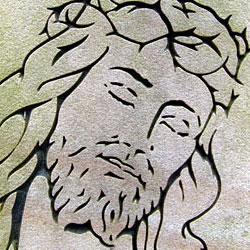Recommended Book: First Epistle of Clement to the Corinthians - Kindle Edition (get Kindle app for phone) (paid link)
Books: My Lenten Journey 2019: Daily Challenges, Questions, and Quotes to Guide You Through the Holy Season of Lent | Meditations for Lent

Do you wish your prayer to fly toward God? Give it two wings: fasting and almsgiving.
-- Saint Augustine
The law of abstinence obliges those 14 years of age and older not to eat meat.
The law of fast obliges all those from ages 18 through 59 to refrain from eating between meals and to limit their eating to one full meal and two lighter meals for the day.
Ash Wednesday and Good Friday are days of both fast and abstinence. In the United States, all Fridays of Lent are days of abstinence.
Lenten Rules for Fasting and Abstinence, Liguori Publications
Abstinence from meats is to be observed by all Catholics 14 years old and older on Ash Wednesday and on all the Fridays of Lent.
Fasting is to be observed on Ash Wednesday by all Catholics who are 18 years of age but not yet 59. [note: more sources say "not yet 60"]. Those who are bound by this may take only one full meal. Two smaller meals are permitted if necessary to maintain strength according to one's needs, but eating solid foods between meals is not permitted.
The special Paschal fast and abstinence are prescribed for Good Friday and encouraged for Holy Saturday.
"The season of Lent is a preparation for the celebration of Easter. The liturgy prepares the catechumens for the celebration of the paschal mystery by the several stages of Christian initiation: it also prepares the faithful, who recall their baptism and do penance in preparation for Easter." (General Norms for the Liturgical Year, #27)
By the threefold discipline of fasting, almsgiving and prayer the church keeps Lent from Ash Wednesday until the evening of Holy Thursday. All of the faithful and the catechumens should undertake serious practice of these three traditions. Failure to observe any penitential days at all or a substantial number of such days must be considered serious.
Archdiocese of Chicago, 1997
As the season of Lent draws near, it is helpful to recall the discipline of the Church in regard to fast, abstinence, and other forms of penance.
- Ash Wednesday and Good Friday are days of fast and abstinence. The Fridays of Lent are days of abstinence in the United States.
- The Obligation of Abstinence (refraining from eating meat) begins at the age of 14. The law of fasting (limiting oneself to one full meal and two lighter meals) obliges all between the ages of 19-59. No one should consider this obligation lightly.
- Those individuals who have a medical condition in which fasting or abstaining may be considered harmful are not obliged to fast or abstain, but should perform some other act of penance or charity.
- As a general rule, a request of dispensation from the obligation of abstinence on Friday of Lent will not be considered, unless some serious reason is present. The attendance at social events, banquets, wedding rehearsals or receptions are not considered sufficient reasons to request a dispensation.
- Pastors and parents are to see to it that minors, though not bound by the law of fast and abstinence, are educated in the authentic sense of penance and encouraged to do acts of penance suitable to their age.
- All members of the Christian Faithful are encouraged to do acts of penance and charity during the Lenten season beyond what is prescribed by law.
- All members of the Christian Faithful are encouraged to avail themselves of the Sacrament of Reconciliation, since it is a true encounter with the loving, forgiving Savior, Who takes away the burden of our sin, forgives our failing and is the source of peace and joy.
- A parish community may celebrate the Easter vigil only ONCE. In the Diocese of Pittsburgh, celebrations of the Easter Vigil ordinarily may not begin before 8:30 pm.
- The celebration of an anticipated Easter Mass, prior to the Easter Vigil, is forbidden.
Diocese of Pittsburgh, 1995